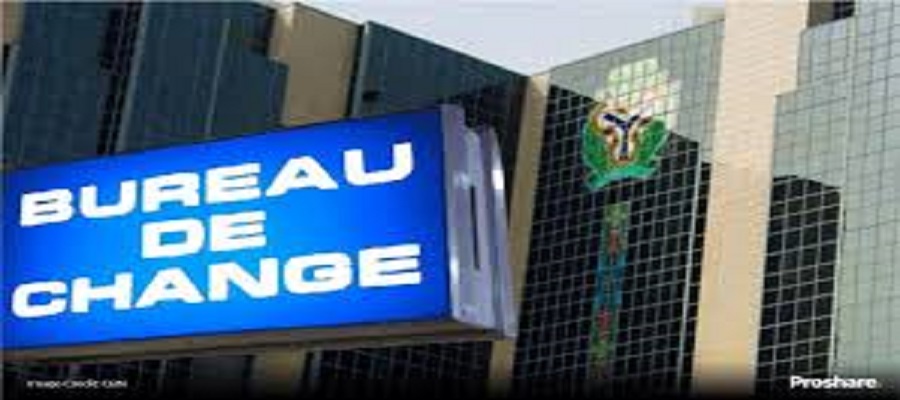E-Financial
Strengthening Nigeria’s Financial Future: The Imperative of Domestic Investment and Market Stability

By Aigbovbioise Aig-Imoukhuede
Nigeria stands at a pivotal juncture in its economic trajectory, navigating through a myriad of challenges and opportunities. The country’s financial outlook is being shaped by a confluence of factors ranging from regulatory changes and technological advancements to global economic trends and internal policy shifts. This piece aims to dissect these elements, drawing insights from the recent Bloomberg Discovery Series (Nigeria) panel session where I had the privilege of participating.

Aigbovbioise Aig-Imoukhuede
• The Current Economic Landscape
Nigeria’s economic landscape is characterised by a complex interplay of growth and stagnation. The National Bureau of Statistics reports growth, which is promising. However, the true metric of economic vitality lies in long-term investment. Unfortunately, Nigeria has been grappling with a significant exodus of multinational companies such as Glaxo, Proctor & Gamble, and PZ Cussons over the past year. This trend underscores a crucial issue: the need for robust domestic investment.
Strengthening Nigeria’s capital markets is paramount. These markets will serve as the bedrock for future investment, ensuring sustainable economic growth. Achieving this necessitates macroeconomic stability, particularly in currency and inflation management. Stability in the naira’s value against the US dollar and controlled inflation are essential for fostering an environment conducive to long-term business planning and investment.
• Regulatory Changes and Their Impacts
Recent regulatory changes are set to reshape Nigeria’s financial sector significantly. The ongoing bank recapitalisation process, which requires banks to raise over N2.0 trillion in fresh capital, is a transformative initiative. This move mirrors the impactful reforms initiated by Governor Soludo two decades ago, promising rapid consolidation and enhanced borrowing capacity within the banking sector.
Beyond banking, the Nigerian Exchange (NGX) is witnessing a surge in initial public offerings (IPOs), including the highly anticipated NNPC and Aradel IPOs. These developments signal a bustling year ahead, with increased market activity and potential for substantial economic gains.
• Technology and Digital Transformation
The impact of technology and digital transformation on Nigeria’s financial services industry is profound. Internally, banks have leveraged technology to streamline processes, enhancing efficiency and customer satisfaction. Externally, technology is broadening financial inclusion, integrating more individuals into the formal financial system.
Start-up internet-only banks are making significant strides, though they have yet to displace established banks. Traditional banks have swiftly adapted, launching their own digital products and leveraging their expertise in liquidity management to maintain a competitive edge. The synergy between fintech innovations and traditional banking institutions is driving a more inclusive and efficient financial ecosystem.
• Domestic and Foreign Investment Trends
While the departure of multinational companies highlights a challenging investment climate, Nigeria’s future lies in its capital markets. These markets must be robust enough to attract and sustain both domestic and foreign investments. Controlling inflation is critical to achieving this goal, as inflation undermines business planning and investor confidence. Once inflation is stabilised, consensus on the naira/dollar exchange rate can be established, fostering a more predictable and attractive investment environment.
• Central Bank of Nigeria’s Monetary Policies
The Central Bank of Nigeria’s recent shift towards orthodox monetary policies marks a significant development. With Nigerian Treasury Bills yielding around 25.0% for one-year T-bills and OMO bill auction yields reaching 29.0%, there is a renewed attraction for investment in the financial system. These high returns are enticing foreign portfolio investors and bolstering the naira.
However, there are trade-offs. High-interest rates impose a burden on borrowers but simultaneously strengthen the case for saving in naira. This policy approach is crucial for stabilising inflation and, by extension, the currency. As these policies take root, Nigeria can expect a more stable and prosperous financial landscape.
• Risks Facing Financial Institutions
Nigeria’s financial institutions are navigating a landscape fraught with risks. High-interest rates, while offering opportunities for profit, also pose significant challenges. Borrowers are under stress, and the valuation of investments must reflect these elevated rates, introducing volatility into financial statements.
The adoption of mark-to-market accounting, championed by the Fund Managers Association of Nigeria, is a crucial step towards mitigating these risks. This accounting method ensures that financial statements accurately reflect current market conditions, fostering transparency and stability in the capital markets.
• Sustainable Finance and ESG Considerations
Sustainable finance is gradually taking root in Nigeria, integrating environmental, social, and governance (ESG) considerations into financial activities. Regulatory policies by the Central Bank of Nigeria (CBN) and the Securities and Exchange Commission (SEC) are paving the way. These policies encompass principles of environmental and social risk management, financial inclusion, and guidelines for green bonds.
Banks and financial institutions are also investing in capacity building and training, equipping themselves to better assess and manage ESG risks. Despite progress, challenges remain. Limited awareness, inadequate regulatory enforcement, and a nascent market for green financial products hinder widespread adoption. However, the global shift towards sustainability presents significant opportunities for Nigeria to leverage its natural resources for sustainable development.
• Financing SMEs: Challenges and Opportunities
Small and medium-sized enterprises (SMEs) are the backbone of Nigeria’s economy, yet they face formidable challenges. Limited access to finance, due to high risk, lack of collateral, and inadequate financial records, is a primary barrier. Additionally, many SME owners lack financial literacy and management skills, further impeding their ability to secure loans.
However, there are promising opportunities. Government initiatives, such as the SME Credit Guarantee Scheme and the Youth Entrepreneurship Support (YES) programme, provide much-needed funding. Policy reforms, like the National Collateral Registry, enhance access to finance by allowing movable assets to be used as collateral.
Innovative financing solutions are also emerging. Crowdfunding platforms, angel investors, and venture capital firms are providing alternative sources of capital. Fintech companies are leveraging technology to simplify the loan application process and reduce reliance on traditional collateral. Microfinance banks (MFBs) offer tailored financial products to SMEs, making microloans more accessible.
• Global Economic Trends and Their Impact
Global economic trends, particularly commodity price fluctuations and geopolitical tensions, significantly impact Nigeria’s financial sector. While commodity prices are relatively stable, the real concern lies with US bond rates. High yields on US Government bonds are drawing dollars away from emerging markets, including Nigeria. This trend is likely to persist until US bond rates decline.
• The Future of Technological Innovations
Technological innovations, particularly blockchain and artificial intelligence (AI), hold transformative potential for Nigeria’s financial industry. Blockchain can enhance security and transparency in financial transactions, while AI can drive efficiency and inclusivity. However, realising this potential requires a supportive ecosystem.
Collaboration among stakeholders—government, financial institutions, technology providers, and academia—is crucial. By fostering such partnerships, Nigeria can harness these technologies to spur innovation, improve financial services, and stimulate economic growth.
Conclusion
Nigeria’s financial outlook is at a crossroads, shaped by a dynamic interplay of internal and external factors. Strengthening capital markets, stabilising the macroeconomic environment, and leveraging technological innovations are essential for sustainable growth. By addressing these challenges and seizing the opportunities, Nigeria can build a resilient and inclusive financial ecosystem, paving the way for a prosperous future.
E-Financial
CBN Waives 2025 Licence Renewal Fee for Bureaux de Change Operators

Central Bank of Nigeria (CBN) has waived the 2025 licence renewal fee for all bureaux de change (BDC) operators.

Jonah Onojah, director of the financial policy and regulation department, announced that the waiver took immediate effect.
“This is to inform all existing bureaux de change that further to the Regulatory and Supervisory Guidelines for Bureau De Change Operations in Nigeria, 2024, and the ongoing transition to the new BDC regulatory structure, the Central Bank of Nigeria (CBN) has approved the waiver of 2025 licence renewal fee, effective immediately,” the statement reads.
“Any bureau de change that has paid for 2025 licence renewal is hereby advised to apply to the Director, Financial Policy and Regulation Department, Central Bank of Nigeria for refund to its account from which the payment emanated.
“The CBN remains committed to fostering stability, transparency, and efficiency in the foreign exchange market while ensuring that operators align with the revised regulatory framework,” the statement said.
On May 22, 2024, CBN approved new guidelines for BDC operations to improve compliance and oversight.
In the guideline, CBN said all existing BDCs are to re-apply for a new licence according to any of the tiers or licence categories of their choice.
CBN said the guidelines are part of its efforts to re-position the BDC market to play its envisioned role in the foreign exchange market in Nigeria.
E-Financial
PalmPay is not a Loan App, says MD

PalmPay, a Mobile Money Operator and digital payment platform has reaffirmed its role as a mobile payment provider, correcting the insinuation that it is a loan App.

Chika Nwosu, Chief Executive Officer, PalmPay, speaking at a press conference in Lagos clarified that PalmPay’s core mission is to provide seamless payment solutions and financial services, not to issue loans.
This clarification became necessary against erroneous messages in some social media platforms that the PalmPay is a loan App, as well as individuals wearing PalmPay-branded clothing allegedly been involved in arresting loan defaulters, raising concerns about the company’s role in debt recovery practices.
He explained that all lending activities on its platform are conducted by third-party financial institutions leveraging its ecosystem, not PalmPay itself.
“PalmPay is not a loan App. We provide a platform for third-party financial institutions to offer their services, including loans, to our users. These institutions operate independently and comply with all regulatory requirements,” Nwosu explained.
More so, Chika Nwosu identified smartphone penetration, internet connectivity and innovative technologies as key factors that are crucial to increased access to mobile money services in Nigeria.
According to him, with smartphone penetration projected to reach 65% by 2026 as well as improved internet infrastructure, more Nigerians will be enabled to access mobile money services.
He disclosed that, with fintech companies such as PalmPay evolving through digital wallets and seamless payment gateways, accessibility to mobile money service was bound to expand soon.
He emphasized that with demand for affordability of financial services growing, more opportunities would be unlocked for PalmPay in the nearest future.
“From under 10,000 agents in 2015 to over 1.5 million agents in 2023, agent networks have become the backbone of mobile money operations in Nigeria. For this reason, we are more likely to see a sharp increase in the number of mobile money agents and merchants. Apart from that, MMOs will increasingly use artificial intelligence to improve customer experiences, such as machine learning, predictive analytics, and fraud detection,” he said.
Donald Ubeh, Head, Risk and Compliance, MLRO at PalmPay, while highlighting the impact of fintech companies such as PalmPay, explained that the coming of PalmPay has led to economic empowerment particularly for individual users and several Small and Medium Scale enterprises.
He noted that many Nigerians including bank customers have migrated their funds to PalmPay owing to convenience and accessibility it provides.
He added that mobile money operators were conceived with the aim of driving financial inclusion for the underserved and unbanked population.
According to EFInA, increasing adoption of fintech companies by Nigerians has led to increase in financial inclusion rate by 13% in 13 years.
E-Financial
Moniepoint MFB Says Rumours of N1.1Bn Theft by Hackers Malicious

Moneipoint has denied reports that Moniepoint MFB, its microfinance bank, was hacked and some N1.1 billion allegedly stolen.

Moniepoint, in a blog post said that the report, which began on social media was malicious and misleading and should be ignored.
According to the company, the alleged theft gained traction on social media, alleging that the company is facing operational challenges due to the hack.
“We categorically state that these claims are untrue, and we urge the public to disregard them in their entirety.
Moniepoint MFB has always maintained the highest standards for digital security and customer fund protection.
It stated that as a duly authorised and licensed financial institution, customer deposits with Moniepoint MFB are insured by Nigeria Deposit Insurance Corporation (NDIC), with the Central Bank of Nigeria (CBN) supervising and regulating its operations to ensure adherence to all applicable standards.

 E-Financial2 days ago
E-Financial2 days agoMoniepoint MFB Says Rumours of N1.1Bn Theft by Hackers Malicious

 General News2 days ago
General News2 days agoCourt Orders Arrest of Access Bank Acting MD, Others over Alleged Theft of Property

 Telecom2 days ago
Telecom2 days agoSERAP Drags Tinubu, Others to Court over ”Arbitrary” Telecom Tariff Hike

 E-Financial2 days ago
E-Financial2 days agoWorld Bank Urges CBN to Sustain Inflation Control Measures

 E-Financial2 days ago
E-Financial2 days agoZenith Bank Reinforces Commitment to Staff Wellbeing with Salary Hike and Promotions

 Telecom2 days ago
Telecom2 days agoFG, WIOCC Partner to Deliver Internet to 3m Homes with $10m Investment

 E-Financial2 days ago
E-Financial2 days agoSEC Warns against Transactions with Risevest, Stecs Cooperative Societies

 Telecom1 day ago
Telecom1 day agoGalaxy Backbone Celebrates Excellence and Innovation in Its People


























